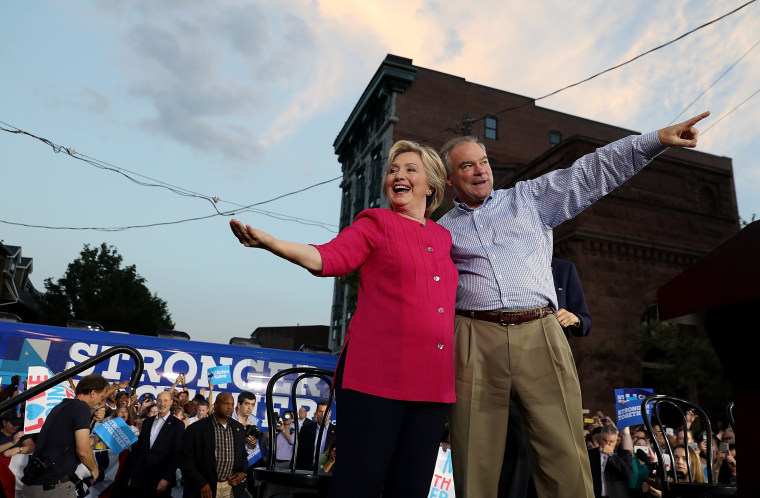In their speeches on racial issues, Hillary Clinton and Tim Kaine have made an argument that President Obama rarely has: white Americans in particular need to change their views and perspectives to fix the nation’s racial problems.
“We white Americans need to do a better job of listening when African Americans talk about the seen and unseen barriers you face every day,” Clinton said last month at the NAACP’s annual convention.
She added, “We need to recognize our privilege and practice humility rather than assume that our experiences are everyone’s experiences. We all need to try as best we can to walk in one another’s shoes, to imagine what it would be like to sit our son or daughter down and have the talk about how carefully they need to act around police because the slightest wrong move could get them hurt or even killed."
Kaine, in a speech Thursday at the Progressive National Baptist Convention in New Orleans, went further, saying that on racial issues there is “work that all Americans have to do, and I will say especially white Americans.”
“It’s so important for those of us in a majority to get out of our comfort zone and learn other realities, and that's what Hillary and I both kind of challenge our Caucasian leaders and Caucasian communities to do,” Kaine said.
Related: Latino Millennials Among Most Worried By White Extremism: Poll
In an op-ed published on CNN.com on Friday, Kaine, who was a lawyer before entering politics, wrote about a black woman that he had represented in a housing discrimination case.
"It's important for those of us who haven't faced barriers like these to acknowledge our privilege — and why those of us in public service must go even further," Kaine said, arguing that Clinton would push to fight housing discrimination if she is elected president.
That Kaine and Clinton are speaking about racial issues is not surprising. Getting a large, enthusiastic backing from African-Americans is important to the Democratic ticket winning in states like North Carolina, Ohio and Virginia. Clinton campaigned alongside the mothers of black men who died in police-involved shootings earlier this year and had them as featured speakers during the Democratic National Convention.
And in terms of policy, Clinton’s ideas on issues of race differ little from Obama’s. She is calling for an expansion of implicit bias training for law enforcement personnel, greater data collection to scrutinize police departments and see if they disproportionately arrest or kill people of color, and a shift from so-called broken windows policing to building closer ties between minority communities and law enforcement officials. The Obama administration is already pursuing versions of many of these policies.
But the way Clinton and Kaine are talking about racial issues now could open up new possibilities if they are elected. First, Clinton and Kaine, because they are white, can speak about so-called white privilege in a way that Obama would be hesitant to do.
Obama took great steps, particularly in his first term, to avoid being cast as a president speaking on behalf of African-Americans, as opposed to leading the whole country. And perhaps because of his own racial background, Obama' s remarks on race rarely put the onus on whites directly, as Clinton and Kaine have.
Secondly, while “privilege” is a vague term, defining racial issues in this way could be helpful in some ways. Obama and his team have been aggressive in taking on clear, obvious issues of race. Obama’s Justice Department has filed suits to block voter ID laws in states across the country and investigated a number of police departments for racial discriminatory conduct. Obama’s Education Department has successfully convinced many school systems to reexamine their use of school suspensions, which are disproportionately targeted at black and Hispanic students.
A focus on white privilege might help with more subtle problems: the intersection of housing and education policy that results in millions of black and Latino kids going to schools that are full of poor, non-white students; the lack of diversity in industries like Hollywood and Silicon Valley; the persistent pay gaps between white and black Americans, even when they have similar levels of education.
Related: For Asian-American Delegates, Clinton-Kaine Ticket Viewed Favorably
The federal government has very little direct influence on racial issues. And Clinton, in office, may choose to avoid these issues, despite her campaign rhetoric.
But Clinton has the potential to govern on racial issues as no modern president has. During his political ascent, Bill Clinton was trying to change the image of the Democratic Party from one that was overly focused on appealing to minorities to one that attracted white swing voters. The political incentives for Republican presidents to challenge white Americans on racial issues are low, since the GOP is an overwhelmingly-white party. Obama was of course the first non-white president.
Clinton, on the other hand, would enter office if elected after a number of killings of blacks by police officers were captured on video, leaving even conservatives like Newt Gingrich acknowledging that there is a problem in relations between blacks and the police. And polls show that white liberals are increasingly convinced that America has an enduring racial discrimination problem, meaning that the coalition of people who elected Clinton would be combination of non-white voters and whites who think she should act to address racial disparities.
“Having a president who uses the bully pulpit and certainly the way she has talked about race in this country, talking about white privilege, talking about systemic racism, talking about this idea of walking in one another’s shoes, she talks about that in front of white audiences, black audiences. And I think having someone who is acknowledging that and who is talking about that and normalizing that on a regular basis is important,” said Karen Finney, a Clinton adviser.
